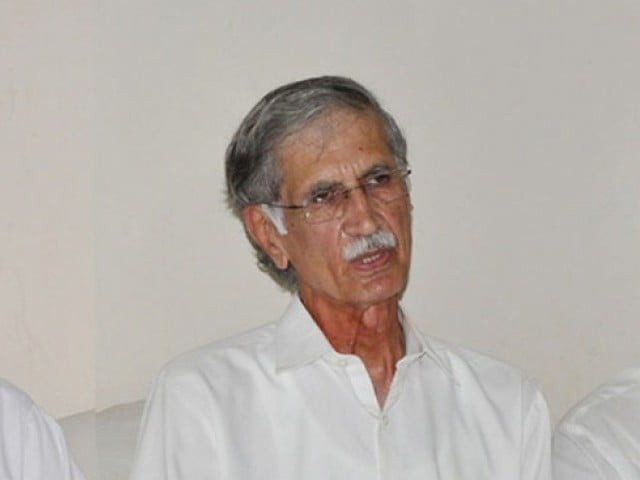Accountability under scrutiny: EC act to be amended after mutual consultation
Chief minister says Ehtesab Commission is not the Khattak commission

File photo of PTI leader Pervez Khattak. Photo: NNI
The chief minister announced legislation relevant to the Khyber-Pakhtunkhwa Ehtesab Commission would be amended in consultation with all political parties. This comes in the backdrop of controversial arrest warrants for members of opposition parties and investigations by the commission.
In a last minute press conference at the Chief Minister House on Thursday, Pervez Khattak said amendments were being made after identifying certain flaws in the K-P Ehtesab Commission Act 2014. Recently, the actions of the Ehtesab Commission (EC) were subject to widespread criticism.
Although the chief minister did not name anyone, his repartee was aimed at clearing the perception the EC was the “Khattak Commission” as was alleged by Senator Sitara Ayaz and others recently implicated in corruption cases.
Khattak said a parliamentary committee would hold talks with the leadership of various political parties to find a solution to the legal lacunae surrounding the commission’s workings.
Potential amendments
Under the changes being considered by the government, nobody would be taken into custody within three months of the commencement of an investigation until there was enough proof. The investigation would be discarded if there was not enough evidence collected.
“The current law is not time bound” he said. “That is what causes misperceptions and delays,” he said while elaborating the framework under which the EC was formed and functions.
“I have never called the director general of the Ehtesab Commission; records of my own office are constantly sought [by the accountability body]”.
He went on to counter allegations levelled against the EC and his government. Khattak said the accountability body was formed under Pakistan Tehreek-e-Insaf’s manifesto which promised justice and an end to corruption.
The making of EC
In June 2013, a core committee was set up to draft the Ehtesab Commission Act with the secretaries for law and establishment, and the anti-corruption director in the chair. The recommendations were submitted to the provincial assembly select committee with members from both the treasury and opposition who promulgated the bill in January 2014.
A search and scrutiny committee (S&SC) was established in March of the same year for the nomination of commissioners, the director general and prosecutor general. A parallel legislative committee was formed with the K-P Assembly speaker as chairperson and members of all parties. The search committee submitted names to the legislative committee after a scrutiny of five and a half months.
Five commissioners were ultimately appointed. DG EC General (retd) Hamid Khan was appointed on the recommendation of the S&SC and duly approved by the legislative committee.
The entire process was transparent; “but those who are corrupt raise the slogan of political victimisation when touched,” said the chief minister. “I do not have the power of interference.”
The first person arrested by the EC was the father of a sitting member of the provincial assembly, he said.
“When the bigger fish are reeled in, everyone shouts foul play.” He said if there were ever any doubts, the government only requested for reinvestigation and never tried of influencing any of them.
Published in The Express Tribune, October 23rd, 2015.













COMMENTS
Comments are moderated and generally will be posted if they are on-topic and not abusive.
For more information, please see our Comments FAQ